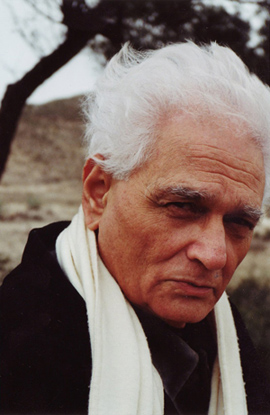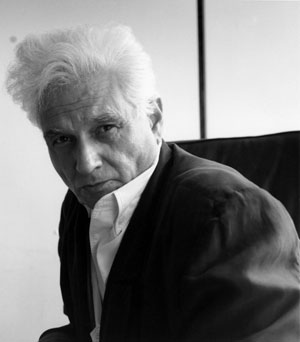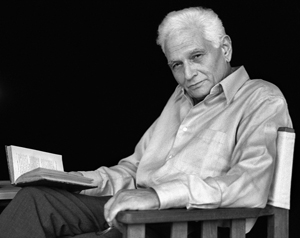| Profiles > Philosophy > Jacques Derrida | |||||||||||||||||
| Jacques Derrida | |||||||||||||||||
|
|||||||||||||||||
|
|||||||||||||||||
| Following the war, from 1960-1964, Derrida taught philosophy at Sorbonne, where he was an assistant to Suzanne Bachelard (daughter of Gaston), Canguilhem, Paul Ricoeur (who in those years coined the term School of Suspicion) and Jean Wahl. In 1964, on the recommendation of Althusser and Jean Hyppolite, Derrida was offered a permanent teaching position at the École Normale Supérieure, which he kept until 1984. In 1965 Derrida began an association with the Tel Quel group of literary and philosophical theorists, which lasted for seven years. Derrida's subsequent distance from the Tel Quel group, after 1971, has been attributed to his reservations about their embrace of Maoism and the Chinese Cultural Revolution. |
|||||||||||||||||
 In 1967, Derrida published his first three books -- L'Écriture et la Différence (Writing and Difference), De la Grammatologie (Grammatology), and La Voix et le Phénomène (Speech and Phenomena). Derrida explored the treatment of writing by several seminal figures in the history of Western thought, including the philosophers Edmund Husserl and Jean-Jacques Rousseau, and the psychoanalyst Sigmund Freud. Other books, published in 1972, include analyses of writing and representation in the work of philosophers such as Plato (La Dissémination), and Hegel, Husserl, and Heidegger – Marges (margins) de la Philosophie. Glas (1974) is an experimental book printed in two columns -- one containing an analysis of key concepts in the philosophy of Hegel and the other a suggestive discussion of the thief, novelist, and playwright Jean Genet. In 1967, Derrida published his first three books -- L'Écriture et la Différence (Writing and Difference), De la Grammatologie (Grammatology), and La Voix et le Phénomène (Speech and Phenomena). Derrida explored the treatment of writing by several seminal figures in the history of Western thought, including the philosophers Edmund Husserl and Jean-Jacques Rousseau, and the psychoanalyst Sigmund Freud. Other books, published in 1972, include analyses of writing and representation in the work of philosophers such as Plato (La Dissémination), and Hegel, Husserl, and Heidegger – Marges (margins) de la Philosophie. Glas (1974) is an experimental book printed in two columns -- one containing an analysis of key concepts in the philosophy of Hegel and the other a suggestive discussion of the thief, novelist, and playwright Jean Genet.He completed his Doctorate in 1980, submitting his previously published books in conjunction with a defense of his intellectual project; the text of Derrida's defense was subsequently published in English translation as The Time of a Thesis: Punctuations. In 1983, Derrida collaborated with Ken McMullen on the film Ghost Dance – Derrida appeared in the film as himself (and also contributed to the script). Derrida was a professor (directeur d'études) at the École des Hautes Études en Sciences Sociales in Paris. With François Châtelet and others, in 1983, he co-founded the Collège international de Philosophie (CIPH), an institution intended to provide a location for philosophical research, which could not be carried out elsewhere. He was elected as its first president. In 1986, Derrida became Professor of the Humanities at the University of California (at Irvine), where he taught until shortly before his death in 2004. His papers were filed in the university archives. After Derrida's death, his widow and sons said they wanted copies of UCI's archives shared with the Institute of Contemporary Publishing Archives in France. The university had sued Derrida's widow and children in an attempt to get manuscripts and correspondence from them that it believed the philosopher had promised to UC Irvine's collection, although the suit was dropped in 2007. |
|||||||||||||||||
| |
|||||||||||||||||
| He was a regular visiting professor at several other major American and European universities, including Johns Hopkins University, Yale University, New York University, Stony Brook University, The New School for Social Research, and the European Graduate School. He was awarded honorary doctorates by the University of Cambridge, Columbia University, The New School for Social Research, the University of Essex, Katholieke Universiteit Leuven (Belgium), University of Silesia (Poland), and many others around the world. Derrida was a member of the American Academy of Arts and Sciences. He received the 2001 Adorno-Preis from the University of Frankfurt. Late in his life, Derrida participated in two biographical documentaries, D'ailleurs, Derrida(Derrida's Elsewhere) by Saafa Fathy (1999) and Derrida by Kirby Dick and Amy Ziering Kofman (2002). |
|||||||||||||||||
| In 2003, Derrida was diagnosed with pancreatic cancer, which reduced his speaking and travelling engagements. He died in a hospital in Paris in the early hours of October 9, 2004. Derrida's philosophical friends, allies, and students included Paul de Man, Jean-François Lyotard, Michel Foucault, Louis Althusser, Emmanuel Levinas, Maurice Blanchot, Gilles Deleuze, Jean-Luc Nancy, Philippe Lacoue-Labarthe, Sarah Kofman, Hélène Cixous, Bernard Stiegler, Alexander García Düttmann, Joseph Cohen, Geoffrey Bennington, Jean-Luc Marion, Gayatri Chakravorty Spivak, Raphael Zagury-Orly, Jacques Ehrmann, Avital Ronell, Judith Butler, Samuel Weber, and Catherine Malabou. |
|||||||||||||||||
| Jean-Luc Nancy and Philippe Lacoue-Labarthe were among Derrida's first students in France, who went on to become well-known and important philosophers in their own right. Despite their considerable differences of subject, and often also of method, they continued to closely interact with each other and with Derrida from the early 1970s. Derrida's most prominent friendship in intellectual life was with Paul de Man, which began with their meeting at Johns Hopkins University and continued until Paul de Man's death in 1983. |
|||||||||||||||||
 Criticism – Although a critical examination of the fundamental concepts is a standard part of philosophical practice in the Western tradition, it has seldom been carried out as rigorously as in the work of Derrida. His writing is known for its extreme subtlety, its meticulous attention to detail, and its tenacious pursuit of the logical implications of supposedly "marginal" features of texts. Nevertheless, his work was met with considerable opposition among some philosophers, especially those in the Anglo-American tradition. In 1992, the proposal by the University of Cambridge to award Derrida an honorary doctorate generated so much controversy that the university took the unusual step of putting the issue to a vote of the dons (and Derrida won). Nineteen philosophers from around the globe published a letter of protest in which they claimed that Derrida's writing was incomprehensible and his major claims either trivial or false. Despite such criticism, Derrida's ideas remain a powerful force in philosophy and other fields. Geoffrey Bennington, Avital Ronell, and Samuel Weber belong to a group of Derrida translators. Many of them are esteemed thinkers in their own right with whom Derrida worked in a collaboration, allowing his prolific output to be translated into English in a timely fashion. Of the 24 philosophers featured on this website, Derrida has one of the longest lists of credits. Some of the selected translations of work by Derrida are as follows: Criticism – Although a critical examination of the fundamental concepts is a standard part of philosophical practice in the Western tradition, it has seldom been carried out as rigorously as in the work of Derrida. His writing is known for its extreme subtlety, its meticulous attention to detail, and its tenacious pursuit of the logical implications of supposedly "marginal" features of texts. Nevertheless, his work was met with considerable opposition among some philosophers, especially those in the Anglo-American tradition. In 1992, the proposal by the University of Cambridge to award Derrida an honorary doctorate generated so much controversy that the university took the unusual step of putting the issue to a vote of the dons (and Derrida won). Nineteen philosophers from around the globe published a letter of protest in which they claimed that Derrida's writing was incomprehensible and his major claims either trivial or false. Despite such criticism, Derrida's ideas remain a powerful force in philosophy and other fields. Geoffrey Bennington, Avital Ronell, and Samuel Weber belong to a group of Derrida translators. Many of them are esteemed thinkers in their own right with whom Derrida worked in a collaboration, allowing his prolific output to be translated into English in a timely fashion. Of the 24 philosophers featured on this website, Derrida has one of the longest lists of credits. Some of the selected translations of work by Derrida are as follows:
|
|||||||||||||||||
|
|||||||||||||||||
|
Credits
http://en.wikipedia.org/wiki/Jacques_Derrida http://www.britannica.com/EBchecked/topic/158661/Jacques-Derrida http://plato.stanford.edu/entries/derrida |
|||||||||||||||||









